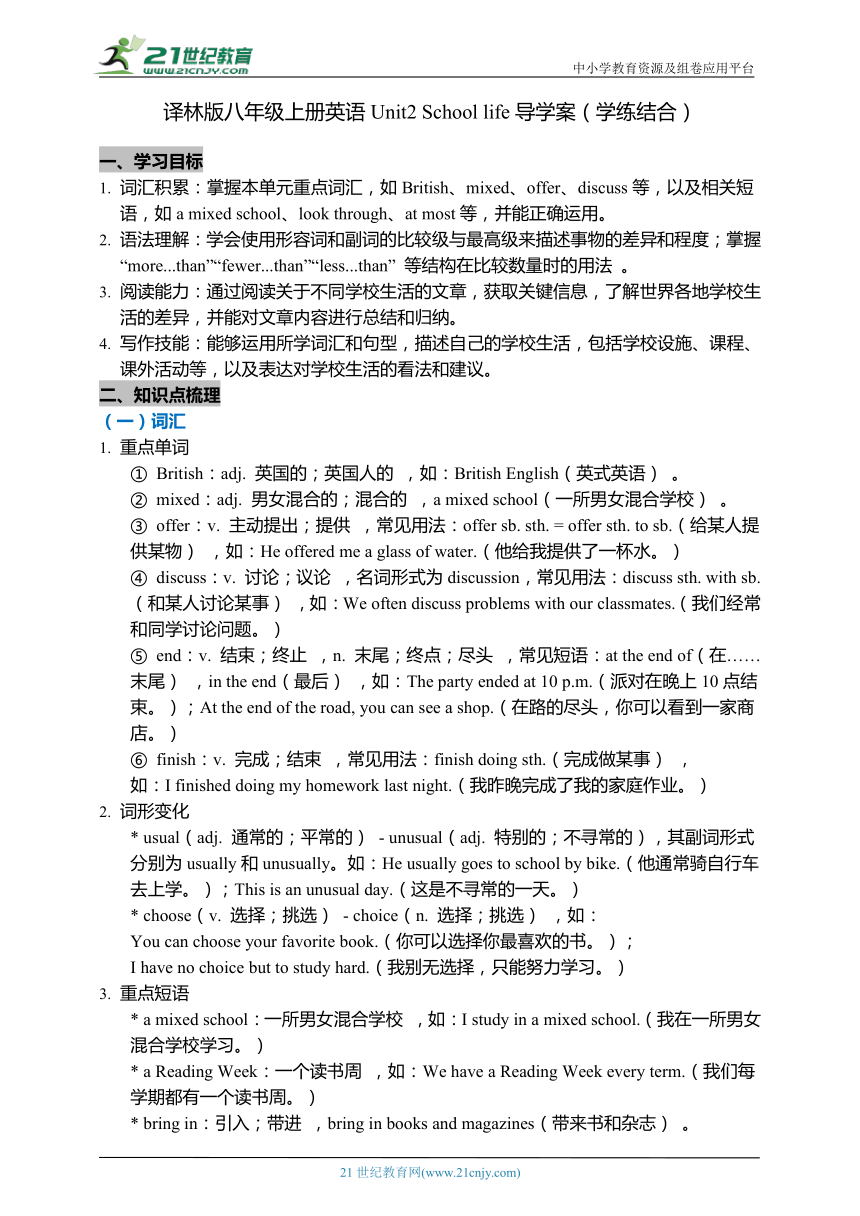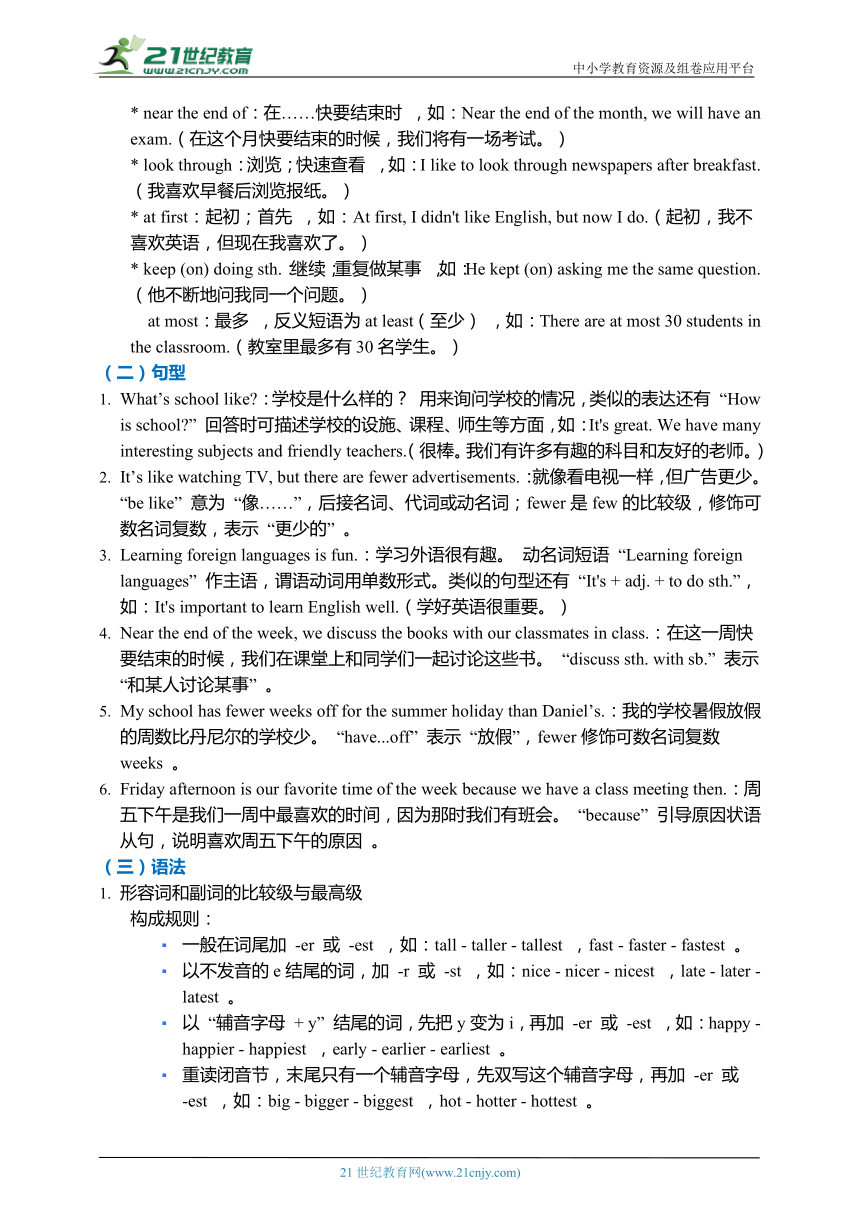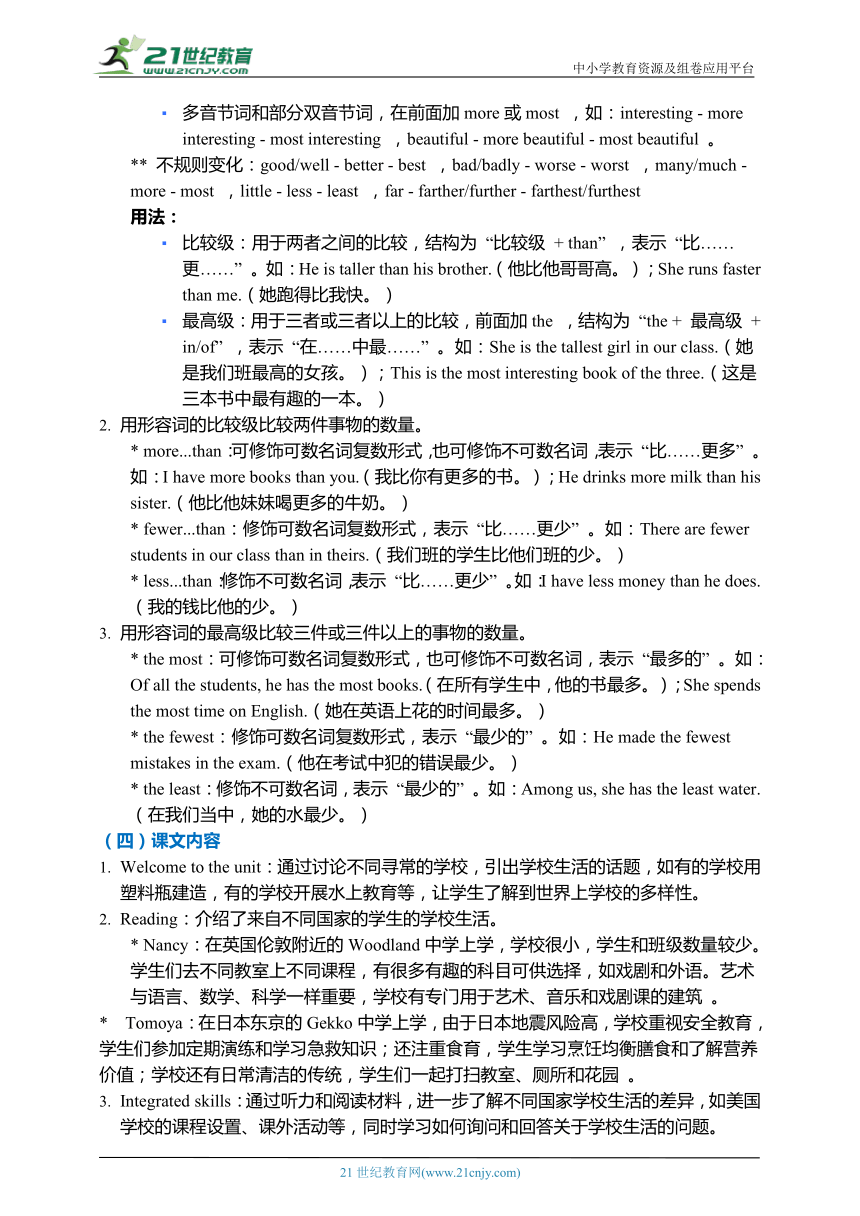Unit2 School life单元导学案(学练结合)—译林版八年级上册英语
文档属性
| 名称 | Unit2 School life单元导学案(学练结合)—译林版八年级上册英语 |  | |
| 格式 | docx | ||
| 文件大小 | 54.5KB | ||
| 资源类型 | 试卷 | ||
| 版本资源 | 译林版 | ||
| 科目 | 英语 | ||
| 更新时间 | 2025-07-31 21:01:55 | ||
图片预览



文档简介
中小学教育资源及组卷应用平台
译林版八年级上册英语Unit2 School life导学案(学练结合)
一、学习目标
词汇积累:掌握本单元重点词汇,如British、mixed、offer、discuss等,以及相关短语,如a mixed school、look through、at most等,并能正确运用。
语法理解:学会使用形容词和副词的比较级与最高级来描述事物的差异和程度;掌握 “more...than”“fewer...than”“less...than” 等结构在比较数量时的用法 。
阅读能力:通过阅读关于不同学校生活的文章,获取关键信息,了解世界各地学校生活的差异,并能对文章内容进行总结和归纳。
写作技能:能够运用所学词汇和句型,描述自己的学校生活,包括学校设施、课程、课外活动等,以及表达对学校生活的看法和建议。
二、知识点梳理
(一)词汇
重点单词
① British:adj. 英国的;英国人的 ,如:British English(英式英语) 。
② mixed:adj. 男女混合的;混合的 ,a mixed school(一所男女混合学校) 。
③ offer:v. 主动提出;提供 ,常见用法:offer sb. sth. = offer sth. to sb.(给某人提供某物) ,如:He offered me a glass of water.(他给我提供了一杯水。)
④ discuss:v. 讨论;议论 ,名词形式为discussion,常见用法:discuss sth. with sb.(和某人讨论某事) ,如:We often discuss problems with our classmates.(我们经常和同学讨论问题。)
⑤ end:v. 结束;终止 ,n. 末尾;终点;尽头 ,常见短语:at the end of(在……末尾) ,in the end(最后) ,如:The party ended at 10 p.m.(派对在晚上10点结束。);At the end of the road, you can see a shop.(在路的尽头,你可以看到一家商店。)
⑥ finish:v. 完成;结束 ,常见用法:finish doing sth.(完成做某事) ,
如:I finished doing my homework last night.(我昨晚完成了我的家庭作业。)
词形变化
* usual(adj. 通常的;平常的) - unusual(adj. 特别的;不寻常的),其副词形式分别为usually和unusually。如:He usually goes to school by bike.(他通常骑自行车去上学。);This is an unusual day.(这是不寻常的一天。)
* choose(v. 选择;挑选) - choice(n. 选择;挑选) ,如:
You can choose your favorite book.(你可以选择你最喜欢的书。);
I have no choice but to study hard.(我别无选择,只能努力学习。)
重点短语
* a mixed school:一所男女混合学校 ,如:I study in a mixed school.(我在一所男女混合学校学习。)
* a Reading Week:一个读书周 ,如:We have a Reading Week every term.(我们每学期都有一个读书周。)
* bring in:引入;带进 ,bring in books and magazines(带来书和杂志) 。
* near the end of:在……快要结束时 ,如:Near the end of the month, we will have an exam.(在这个月快要结束的时候,我们将有一场考试。)
* look through:浏览;快速查看 ,如:I like to look through newspapers after breakfast.(我喜欢早餐后浏览报纸。)
* at first:起初;首先 ,如:At first, I didn't like English, but now I do.(起初,我不喜欢英语,但现在我喜欢了。)
* keep (on) doing sth.:继续;重复做某事 ,如:He kept (on) asking me the same question.(他不断地问我同一个问题。)
at most:最多 ,反义短语为at least(至少) ,如:There are at most 30 students in the classroom.(教室里最多有30名学生。)
(二)句型
What’s school like :学校是什么样的? 用来询问学校的情况,类似的表达还有 “How is school ” 回答时可描述学校的设施、课程、师生等方面,如:It's great. We have many interesting subjects and friendly teachers.(很棒。我们有许多有趣的科目和友好的老师。)
It’s like watching TV, but there are fewer advertisements.:就像看电视一样,但广告更少。 “be like” 意为 “像……”,后接名词、代词或动名词;fewer是few的比较级,修饰可数名词复数,表示 “更少的” 。
Learning foreign languages is fun.:学习外语很有趣。 动名词短语 “Learning foreign languages” 作主语,谓语动词用单数形式。类似的句型还有 “It's + adj. + to do sth.”,如:It's important to learn English well.(学好英语很重要。)
Near the end of the week, we discuss the books with our classmates in class.:在这一周快要结束的时候,我们在课堂上和同学们一起讨论这些书。 “discuss sth. with sb.” 表示 “和某人讨论某事” 。
My school has fewer weeks off for the summer holiday than Daniel’s.:我的学校暑假放假的周数比丹尼尔的学校少。 “have...off” 表示 “放假”,fewer修饰可数名词复数weeks 。
Friday afternoon is our favorite time of the week because we have a class meeting then.:周五下午是我们一周中最喜欢的时间,因为那时我们有班会。 “because” 引导原因状语从句,说明喜欢周五下午的原因 。
(三)语法
形容词和副词的比较级与最高级
构成规则:
一般在词尾加 -er 或 -est ,如:tall - taller - tallest ,fast - faster - fastest 。
以不发音的e结尾的词,加 -r 或 -st ,如:nice - nicer - nicest ,late - later - latest 。
以 “辅音字母 + y” 结尾的词,先把y变为i,再加 -er 或 -est ,如:happy - happier - happiest ,early - earlier - earliest 。
重读闭音节,末尾只有一个辅音字母,先双写这个辅音字母,再加 -er 或 -est ,如:big - bigger - biggest ,hot - hotter - hottest 。
多音节词和部分双音节词,在前面加more或most ,如:interesting - more interesting - most interesting ,beautiful - more beautiful - most beautiful 。
** 不规则变化:good/well - better - best ,bad/badly - worse - worst ,many/much - more - most ,little - less - least ,far - farther/further - farthest/furthest
用法:
比较级:用于两者之间的比较,结构为 “比较级 + than” ,表示 “比……更……” 。如:He is taller than his brother.(他比他哥哥高。);She runs faster than me.(她跑得比我快。)
最高级:用于三者或三者以上的比较,前面加the ,结构为 “the + 最高级 + in/of” ,表示 “在……中最……” 。如:She is the tallest girl in our class.(她是我们班最高的女孩。);This is the most interesting book of the three.(这是三本书中最有趣的一本。)
用形容词的比较级比较两件事物的数量。
* more...than:可修饰可数名词复数形式,也可修饰不可数名词,表示 “比……更多” 。如:I have more books than you.(我比你有更多的书。);He drinks more milk than his sister.(他比他妹妹喝更多的牛奶。)
* fewer...than:修饰可数名词复数形式,表示 “比……更少” 。如:There are fewer students in our class than in theirs.(我们班的学生比他们班的少。)
* less...than:修饰不可数名词,表示 “比……更少” 。如:I have less money than he does.(我的钱比他的少。)
用形容词的最高级比较三件或三件以上的事物的数量。
* the most:可修饰可数名词复数形式,也可修饰不可数名词,表示 “最多的” 。如:Of all the students, he has the most books.(在所有学生中,他的书最多。);She spends the most time on English.(她在英语上花的时间最多。)
* the fewest:修饰可数名词复数形式,表示 “最少的” 。如:He made the fewest mistakes in the exam.(他在考试中犯的错误最少。)
* the least:修饰不可数名词,表示 “最少的” 。如:Among us, she has the least water.(在我们当中,她的水最少。)
(四)课文内容
Welcome to the unit:通过讨论不同寻常的学校,引出学校生活的话题,如有的学校用塑料瓶建造,有的学校开展水上教育等,让学生了解到世界上学校的多样性。
Reading:介绍了来自不同国家的学生的学校生活。
* Nancy:在英国伦敦附近的Woodland中学上学,学校很小,学生和班级数量较少。学生们去不同教室上不同课程,有很多有趣的科目可供选择,如戏剧和外语。艺术与语言、数学、科学一样重要,学校有专门用于艺术、音乐和戏剧课的建筑 。
* Tomoya:在日本东京的Gekko中学上学,由于日本地震风险高,学校重视安全教育,学生们参加定期演练和学习急救知识;还注重食育,学生学习烹饪均衡膳食和了解营养价值;学校还有日常清洁的传统,学生们一起打扫教室、厕所和花园 。
Integrated skills:通过听力和阅读材料,进一步了解不同国家学校生活的差异,如美国学校的课程设置、课外活动等,同时学习如何询问和回答关于学校生活的问题。
Study skills:学习如何使用后缀 -ish,-ian,-ese 和 -n 来构成表示国家、语言或国籍的词,如British(英国的;英国人的),Canadian(加拿大的;加拿大人的),Chinese(中国的;中国人的;汉语),American(美国的;美国人的) 。
Task:要求学生描述自己理想中的学校,包括学校的设施、课程、课外活动、上学和放学时间等方面 。可以参考文中描述学校生活的词汇和句型,如 “My ideal school has a large playground...”“We have lots of interesting subjects like...” 等 。
三、随堂练习
(一)词汇运用(每题1分,共10分)
My school is a m______ school. Boys and girls have lessons together.
We often d______ the problems in class and learn from each other.
At the e______ of the story, the little girl found her mother.
She is very kind and often o______ to help others.
I like to l______ through magazines in my free time.
We have a R______ Week every term. We can borrow more books from the library.
He runs f______ than his brother.
Among the three boys, Tom studies the h______.
There are f______ students in our class than in Class Two.
Which subject do you like b______, English, Maths or Chinese
(二)单项选择(每题1分,共10分)
—What’s your school life like
—______.
It’s a famous school B. It’s very colorful
C. I like my school D. I don’t like my school
My school has ______ weeks off in the summertime than Daniel’s.
A. many B. much C. more D. most
Learning foreign languages ______ fun.
A. am B. is C. are D. be
She is ______ than her sister.
A. tall B. more tall C. taller D. the tallest
—______ do you go to the library
—Once a week.
A. How often B. How long C. How soon D. How many
We often discuss the books ______ our classmates in class.
A. for B. about C. with D. to
There are ______ students in our class than in theirs.
A. few B. fewer C. little D. less
Friday afternoon is our favorite time of the week ______ we have a class meeting then.
A. because B. so C. but D. or
He ______ his homework at 9 o’clock last night.
A. finishes B. finished C. will finish D. is finishing
This is ______ book of the three.
interesting B. more interesting
C. the most interesting D. the more interesting
(三)句型转换(每题3分,共15分)
My school life is very interesting.(改为感叹句)
______ ______ my school life is!
Nancy’s school has fewer students than Tomoya’s.(改为同义句)
Tomoya’s school has ______ students ______ Nancy’s.
I spent two hours doing my homework yesterday.(改为同义句)
It ______ me two hours ______ ______ my homework yesterday.
They are discussing how they can improve their lives.(改为简单句)
They are discussing how ______ ______ their lives.
He is the tallest boy in his class.(改为同义句)
He is taller than ______ ______ boy in his class.
(四)阅读理解(每题5分,共15分)
阅读下面短文,回答问题。
In many English schools, there is a “Reading Week” every term. All the students bring their favorite books to school and share them with their classmates.
On the first day, the headteacher always makes a speech to start the Reading Week. Then students can read books in the library or in the classrooms. They can also take their books outside and read in the playground or under the trees.
During the Reading Week, students have more time to read. They don’t have to do any homework. They can talk about the books with their friends. They can also listen to talks about interesting books from teachers or other students.
The Reading Week is very popular among students. They all have a good time during the week.
What do the students do during the “Reading Week” in many English schools
Who makes a speech to start the Reading Week on the first day
Why is the Reading Week popular among students
(五)书面表达(10分)
以“My School Life”为题,写一篇短文,描述你的学校生活。内容包括学校的设施、课程、课外活动等,至少80词 。
答案
(一)词汇运用
mixed 2. discuss 3. end 4. offers 5. look 6. Reading
7. faster 8. hardest 9. fewer 10. best
(二)单项选择
1 - 5 BCBCA 6 - 10 CBABC
(三)句型转换
How interesting 2. more; than 3. took; to do 4. to improve 5. any other
(四)阅读理解
They bring their favorite books to school and share them with their classmates. They can read books in the library, classrooms, playground or under the trees. They can talk about the books with their friends and listen to talks about interesting books from teachers or other students.
The headteacher.
Because they have more time to read, don't have to do any homework and can have a good time.
(五)书面表达(参考范文)
My School Life
My school life is busy but interesting.
Our school is big and beautiful with a large playground, a modern library and many bright classrooms. We have a lot of subjects at school, such as Maths, Chinese, English and Science. Among them, I like English best because I enjoy learning new words and reading interesting stories.
After class, there are various after - school activities. I am a member of the art club. I often draw pictures with my friends there. Sometimes, we have sports on the playground.
All in all, I love my school life. It makes my days full and meaningful.
21世纪教育网 www.21cnjy.com 精品试卷·第 2 页 (共 2 页)
21世纪教育网(www.21cnjy.com)
译林版八年级上册英语Unit2 School life导学案(学练结合)
一、学习目标
词汇积累:掌握本单元重点词汇,如British、mixed、offer、discuss等,以及相关短语,如a mixed school、look through、at most等,并能正确运用。
语法理解:学会使用形容词和副词的比较级与最高级来描述事物的差异和程度;掌握 “more...than”“fewer...than”“less...than” 等结构在比较数量时的用法 。
阅读能力:通过阅读关于不同学校生活的文章,获取关键信息,了解世界各地学校生活的差异,并能对文章内容进行总结和归纳。
写作技能:能够运用所学词汇和句型,描述自己的学校生活,包括学校设施、课程、课外活动等,以及表达对学校生活的看法和建议。
二、知识点梳理
(一)词汇
重点单词
① British:adj. 英国的;英国人的 ,如:British English(英式英语) 。
② mixed:adj. 男女混合的;混合的 ,a mixed school(一所男女混合学校) 。
③ offer:v. 主动提出;提供 ,常见用法:offer sb. sth. = offer sth. to sb.(给某人提供某物) ,如:He offered me a glass of water.(他给我提供了一杯水。)
④ discuss:v. 讨论;议论 ,名词形式为discussion,常见用法:discuss sth. with sb.(和某人讨论某事) ,如:We often discuss problems with our classmates.(我们经常和同学讨论问题。)
⑤ end:v. 结束;终止 ,n. 末尾;终点;尽头 ,常见短语:at the end of(在……末尾) ,in the end(最后) ,如:The party ended at 10 p.m.(派对在晚上10点结束。);At the end of the road, you can see a shop.(在路的尽头,你可以看到一家商店。)
⑥ finish:v. 完成;结束 ,常见用法:finish doing sth.(完成做某事) ,
如:I finished doing my homework last night.(我昨晚完成了我的家庭作业。)
词形变化
* usual(adj. 通常的;平常的) - unusual(adj. 特别的;不寻常的),其副词形式分别为usually和unusually。如:He usually goes to school by bike.(他通常骑自行车去上学。);This is an unusual day.(这是不寻常的一天。)
* choose(v. 选择;挑选) - choice(n. 选择;挑选) ,如:
You can choose your favorite book.(你可以选择你最喜欢的书。);
I have no choice but to study hard.(我别无选择,只能努力学习。)
重点短语
* a mixed school:一所男女混合学校 ,如:I study in a mixed school.(我在一所男女混合学校学习。)
* a Reading Week:一个读书周 ,如:We have a Reading Week every term.(我们每学期都有一个读书周。)
* bring in:引入;带进 ,bring in books and magazines(带来书和杂志) 。
* near the end of:在……快要结束时 ,如:Near the end of the month, we will have an exam.(在这个月快要结束的时候,我们将有一场考试。)
* look through:浏览;快速查看 ,如:I like to look through newspapers after breakfast.(我喜欢早餐后浏览报纸。)
* at first:起初;首先 ,如:At first, I didn't like English, but now I do.(起初,我不喜欢英语,但现在我喜欢了。)
* keep (on) doing sth.:继续;重复做某事 ,如:He kept (on) asking me the same question.(他不断地问我同一个问题。)
at most:最多 ,反义短语为at least(至少) ,如:There are at most 30 students in the classroom.(教室里最多有30名学生。)
(二)句型
What’s school like :学校是什么样的? 用来询问学校的情况,类似的表达还有 “How is school ” 回答时可描述学校的设施、课程、师生等方面,如:It's great. We have many interesting subjects and friendly teachers.(很棒。我们有许多有趣的科目和友好的老师。)
It’s like watching TV, but there are fewer advertisements.:就像看电视一样,但广告更少。 “be like” 意为 “像……”,后接名词、代词或动名词;fewer是few的比较级,修饰可数名词复数,表示 “更少的” 。
Learning foreign languages is fun.:学习外语很有趣。 动名词短语 “Learning foreign languages” 作主语,谓语动词用单数形式。类似的句型还有 “It's + adj. + to do sth.”,如:It's important to learn English well.(学好英语很重要。)
Near the end of the week, we discuss the books with our classmates in class.:在这一周快要结束的时候,我们在课堂上和同学们一起讨论这些书。 “discuss sth. with sb.” 表示 “和某人讨论某事” 。
My school has fewer weeks off for the summer holiday than Daniel’s.:我的学校暑假放假的周数比丹尼尔的学校少。 “have...off” 表示 “放假”,fewer修饰可数名词复数weeks 。
Friday afternoon is our favorite time of the week because we have a class meeting then.:周五下午是我们一周中最喜欢的时间,因为那时我们有班会。 “because” 引导原因状语从句,说明喜欢周五下午的原因 。
(三)语法
形容词和副词的比较级与最高级
构成规则:
一般在词尾加 -er 或 -est ,如:tall - taller - tallest ,fast - faster - fastest 。
以不发音的e结尾的词,加 -r 或 -st ,如:nice - nicer - nicest ,late - later - latest 。
以 “辅音字母 + y” 结尾的词,先把y变为i,再加 -er 或 -est ,如:happy - happier - happiest ,early - earlier - earliest 。
重读闭音节,末尾只有一个辅音字母,先双写这个辅音字母,再加 -er 或 -est ,如:big - bigger - biggest ,hot - hotter - hottest 。
多音节词和部分双音节词,在前面加more或most ,如:interesting - more interesting - most interesting ,beautiful - more beautiful - most beautiful 。
** 不规则变化:good/well - better - best ,bad/badly - worse - worst ,many/much - more - most ,little - less - least ,far - farther/further - farthest/furthest
用法:
比较级:用于两者之间的比较,结构为 “比较级 + than” ,表示 “比……更……” 。如:He is taller than his brother.(他比他哥哥高。);She runs faster than me.(她跑得比我快。)
最高级:用于三者或三者以上的比较,前面加the ,结构为 “the + 最高级 + in/of” ,表示 “在……中最……” 。如:She is the tallest girl in our class.(她是我们班最高的女孩。);This is the most interesting book of the three.(这是三本书中最有趣的一本。)
用形容词的比较级比较两件事物的数量。
* more...than:可修饰可数名词复数形式,也可修饰不可数名词,表示 “比……更多” 。如:I have more books than you.(我比你有更多的书。);He drinks more milk than his sister.(他比他妹妹喝更多的牛奶。)
* fewer...than:修饰可数名词复数形式,表示 “比……更少” 。如:There are fewer students in our class than in theirs.(我们班的学生比他们班的少。)
* less...than:修饰不可数名词,表示 “比……更少” 。如:I have less money than he does.(我的钱比他的少。)
用形容词的最高级比较三件或三件以上的事物的数量。
* the most:可修饰可数名词复数形式,也可修饰不可数名词,表示 “最多的” 。如:Of all the students, he has the most books.(在所有学生中,他的书最多。);She spends the most time on English.(她在英语上花的时间最多。)
* the fewest:修饰可数名词复数形式,表示 “最少的” 。如:He made the fewest mistakes in the exam.(他在考试中犯的错误最少。)
* the least:修饰不可数名词,表示 “最少的” 。如:Among us, she has the least water.(在我们当中,她的水最少。)
(四)课文内容
Welcome to the unit:通过讨论不同寻常的学校,引出学校生活的话题,如有的学校用塑料瓶建造,有的学校开展水上教育等,让学生了解到世界上学校的多样性。
Reading:介绍了来自不同国家的学生的学校生活。
* Nancy:在英国伦敦附近的Woodland中学上学,学校很小,学生和班级数量较少。学生们去不同教室上不同课程,有很多有趣的科目可供选择,如戏剧和外语。艺术与语言、数学、科学一样重要,学校有专门用于艺术、音乐和戏剧课的建筑 。
* Tomoya:在日本东京的Gekko中学上学,由于日本地震风险高,学校重视安全教育,学生们参加定期演练和学习急救知识;还注重食育,学生学习烹饪均衡膳食和了解营养价值;学校还有日常清洁的传统,学生们一起打扫教室、厕所和花园 。
Integrated skills:通过听力和阅读材料,进一步了解不同国家学校生活的差异,如美国学校的课程设置、课外活动等,同时学习如何询问和回答关于学校生活的问题。
Study skills:学习如何使用后缀 -ish,-ian,-ese 和 -n 来构成表示国家、语言或国籍的词,如British(英国的;英国人的),Canadian(加拿大的;加拿大人的),Chinese(中国的;中国人的;汉语),American(美国的;美国人的) 。
Task:要求学生描述自己理想中的学校,包括学校的设施、课程、课外活动、上学和放学时间等方面 。可以参考文中描述学校生活的词汇和句型,如 “My ideal school has a large playground...”“We have lots of interesting subjects like...” 等 。
三、随堂练习
(一)词汇运用(每题1分,共10分)
My school is a m______ school. Boys and girls have lessons together.
We often d______ the problems in class and learn from each other.
At the e______ of the story, the little girl found her mother.
She is very kind and often o______ to help others.
I like to l______ through magazines in my free time.
We have a R______ Week every term. We can borrow more books from the library.
He runs f______ than his brother.
Among the three boys, Tom studies the h______.
There are f______ students in our class than in Class Two.
Which subject do you like b______, English, Maths or Chinese
(二)单项选择(每题1分,共10分)
—What’s your school life like
—______.
It’s a famous school B. It’s very colorful
C. I like my school D. I don’t like my school
My school has ______ weeks off in the summertime than Daniel’s.
A. many B. much C. more D. most
Learning foreign languages ______ fun.
A. am B. is C. are D. be
She is ______ than her sister.
A. tall B. more tall C. taller D. the tallest
—______ do you go to the library
—Once a week.
A. How often B. How long C. How soon D. How many
We often discuss the books ______ our classmates in class.
A. for B. about C. with D. to
There are ______ students in our class than in theirs.
A. few B. fewer C. little D. less
Friday afternoon is our favorite time of the week ______ we have a class meeting then.
A. because B. so C. but D. or
He ______ his homework at 9 o’clock last night.
A. finishes B. finished C. will finish D. is finishing
This is ______ book of the three.
interesting B. more interesting
C. the most interesting D. the more interesting
(三)句型转换(每题3分,共15分)
My school life is very interesting.(改为感叹句)
______ ______ my school life is!
Nancy’s school has fewer students than Tomoya’s.(改为同义句)
Tomoya’s school has ______ students ______ Nancy’s.
I spent two hours doing my homework yesterday.(改为同义句)
It ______ me two hours ______ ______ my homework yesterday.
They are discussing how they can improve their lives.(改为简单句)
They are discussing how ______ ______ their lives.
He is the tallest boy in his class.(改为同义句)
He is taller than ______ ______ boy in his class.
(四)阅读理解(每题5分,共15分)
阅读下面短文,回答问题。
In many English schools, there is a “Reading Week” every term. All the students bring their favorite books to school and share them with their classmates.
On the first day, the headteacher always makes a speech to start the Reading Week. Then students can read books in the library or in the classrooms. They can also take their books outside and read in the playground or under the trees.
During the Reading Week, students have more time to read. They don’t have to do any homework. They can talk about the books with their friends. They can also listen to talks about interesting books from teachers or other students.
The Reading Week is very popular among students. They all have a good time during the week.
What do the students do during the “Reading Week” in many English schools
Who makes a speech to start the Reading Week on the first day
Why is the Reading Week popular among students
(五)书面表达(10分)
以“My School Life”为题,写一篇短文,描述你的学校生活。内容包括学校的设施、课程、课外活动等,至少80词 。
答案
(一)词汇运用
mixed 2. discuss 3. end 4. offers 5. look 6. Reading
7. faster 8. hardest 9. fewer 10. best
(二)单项选择
1 - 5 BCBCA 6 - 10 CBABC
(三)句型转换
How interesting 2. more; than 3. took; to do 4. to improve 5. any other
(四)阅读理解
They bring their favorite books to school and share them with their classmates. They can read books in the library, classrooms, playground or under the trees. They can talk about the books with their friends and listen to talks about interesting books from teachers or other students.
The headteacher.
Because they have more time to read, don't have to do any homework and can have a good time.
(五)书面表达(参考范文)
My School Life
My school life is busy but interesting.
Our school is big and beautiful with a large playground, a modern library and many bright classrooms. We have a lot of subjects at school, such as Maths, Chinese, English and Science. Among them, I like English best because I enjoy learning new words and reading interesting stories.
After class, there are various after - school activities. I am a member of the art club. I often draw pictures with my friends there. Sometimes, we have sports on the playground.
All in all, I love my school life. It makes my days full and meaningful.
21世纪教育网 www.21cnjy.com 精品试卷·第 2 页 (共 2 页)
21世纪教育网(www.21cnjy.com)
同课章节目录
